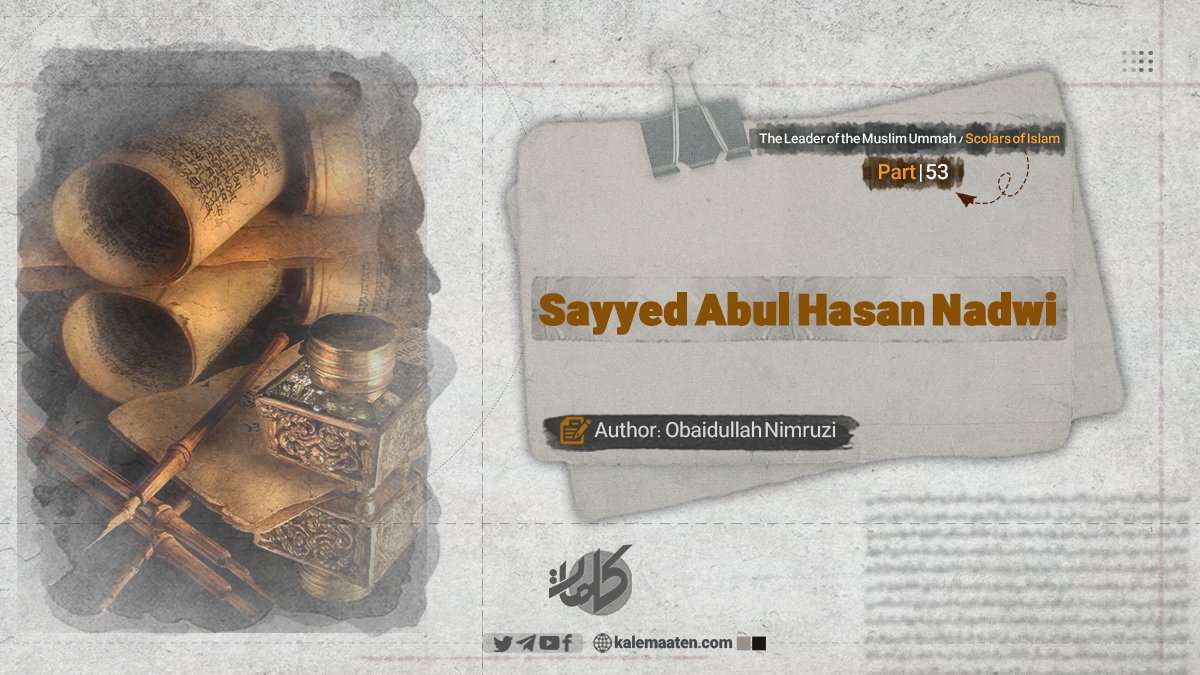
Author: Obaidullah Nimruzi
Allama Sayyed Abul Hasan Nadwi ‘May Allah have mercy on him’ (Part 53)
A great man in the field of Da’wah (invitation) and reformation
The Method of Mawlana Nadwi:
One of the methods of Da’wah (invitation) employed by Mawlana Nadwi was gentle speech combined with firmness, as Allah, the Almighty, has said: “فقولا له قولا لينا لعله يتذكر او يخشى.” His straightforwardness in inviting others was such that at times it seemed he might risk his life. Mawlana Nadwi was deeply concerned with religious guidance, social reform, and political advisement, knowing that the Muslim community would bear the consequences of all shortcomings as they are part of the same nation.
Mawlana considered all aspects of wisdom and insight in his invitation and preaching. With unmatched self-sufficiency, lofty thoughts, deep concern for the Ummah, correct intentions, and a firm resolve for reform, he never looked greedily at rulers and those in positions of power. This can be deemed as one of the unparalleled successes of Imam Nadwi in the contemporary era. He believed that if the invitation comes from a heartfelt and aware soul, presented with a soft and gentle approach, it will undoubtedly have an impact.
For example, as Prophet Ibrahim (peace be upon him) called his father, he used the words: “يا ابت لم تعبد ما لايسمع ولا يبصر ولا يغنى عنك شيئا…” The term “يا ابت” should be translated as “My dear father!”
Similarly, the Messenger of Allah addressed his uncle, Abu Talib, in the most sensitive moments with: “يا عم لو وضعوا الشمس…” Here, “يا عم” translates to “My dear uncle!” This manner of addressing others is essential for effective invitation.
Imam Nadwi drew much inspiration from the Quran in his invitations, often referring to Quranic stories to extract valuable lessons. In this regard, he frequently recalled the story of Prophet Ibrahim with his father, the invitation of Prophet Yusuf (peace be upon him) to his two fellow prisoners, and the example of the believing man from Pharaoh’s family. These stories provided full examples of invitations that showcased wisdom and insight, ultimately leading him to reap the sweetest fruits and greatest benefits on the path of Islamic awakening.
Furthermore, he benefited from the reformist and wise methods of the great leaders of the Ummah and the torchbearers of Islamic invitation, especially praising the exemplary efforts of the great scholar, Sheikh Ahmad Sir Hindi, and following in his footsteps. Just as Sheikh Ahmad Sir Hindi achieved remarkable successes in promoting Islam, Mawlana Nadwi also found success on this path.
Mawlana Nadwi believed that practical examples leave a profound impact; a person who exemplifies good behavior speaks louder and more effectively than a thousand words devoid of action. As the saying goes, “Two hundred words are no match for half an action.”
Mawlana Nadwi stated: “By Allah, as long as the world exists, this will always be the case: the first thing that has a significant impact is the practical example.” He held that purifying hearts and cleansing souls is the work of true scholars and sincere callers, whose prayers, worship, life, and death are for Allah. These individuals constantly strive for the guidance of the Ummah; as a result of their sincere invitations, Allah guides the misguided, grants repentance to sinners, and directs the misled to the straight path.
Their words, coming from the heart, have a profound effect on the hearts of the people. Mawlana believed that there is a key to this matter, which opens all locks, and that key is faith—faith that the Messenger of Allah employed to open the hearts of the Arabs.
Continues…



